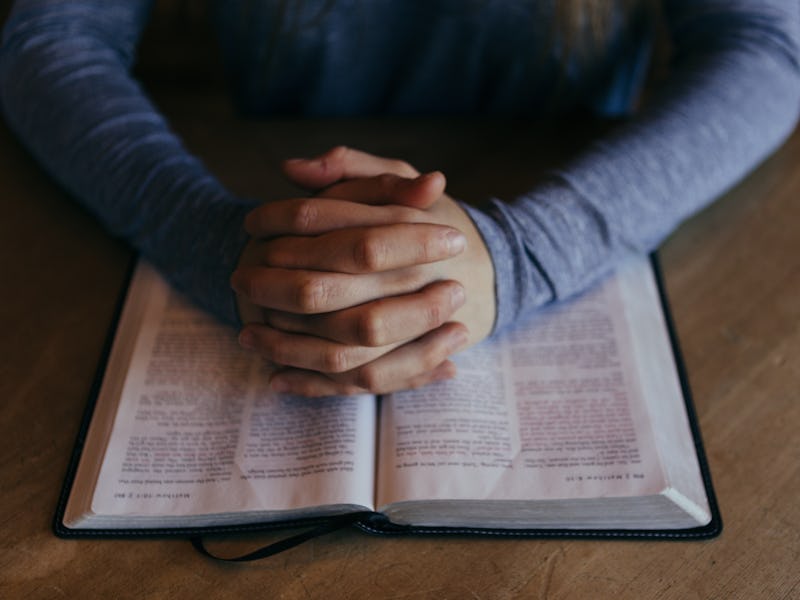Why Atheists Can't Deny the Power of Prayer: Mental Health Is a Goddamn Blessing
Supplication is like spin class. It makes you stronger even if it doesn't get you anywhere.

There is not a universal definition, purpose, or feeling associated with the ritual of prayer. But it is a practice that most people seem to fundamentally understand, a transposition of hope into the context of supplication sometimes accompanied by specific actions: placing palms together, bowing down, the repetition of powerful words. The reason prayer feels universal is that it can be universally felt. Metaphysics aside, the act results in discernible, describable changes in the human body. Science and prayer are hardly in opposition. The one proves that the other — via internal mechanics — works.
Prayer is the psychological equivalent of spin class; it can keep you healthy even if you know you’re not making real progress.
Researchers have identified certain aspects of prayer that are consistently found across religions. Most adherents use traditional rules and rituals to guide their prayers, while the actual prayer touches on themes like materialistic petition, confession, hopes for others, and a search for peace. There is typically inward (connection with oneself), outward (human to human), and upward (human to divine) prayer, all of which hinge on a sense of compassion and all of which can be connected to the central elements of mainstream psychology.
“Prayer is thus the psychology of religion in action and literally reflects virtually ever facet of behavioral scientific psychology, from its neural roots to complex social responsivity,” write professors Bernard Spilka and Kevin Ladd in their book The Psychology of Prayer.
In the United States alone there has been a drop in the amount of Americans who say they pray — but the number is still huge. According to Spilka and Ladd, in 2008 90 percent of Americans claimed they prayed at least once a week. Today, Pew Research reports that 55 percent of Americans say they pray every day.
And more power to them. A 2014 study in the Journal of Experimental Psychology found that personal prayer helps people with self-control, while a 2010 study in Psychological Science announced that prayer increases people’s rates of forgiveness for their friends and significant others. This was because, the researchers write, that typically when a conflict occurs people are consumed with thinking of themselves. The practice of prayer, however, shifted that attention back to the people that shared the conflict which prompted resolution and forgiveness.
Spiritual practices tend to improve coping skills.
In the same vein of emotional healing prompted by prayer, a 2010 study published in Social Psychology Quarterly argues that prayer is also an effective way to manage emotions. In a survey of predominantly Christian Americans, the University of Wisconsin-Madison researchers found that people — particularly those in volatile relationships — were able to use deities as pseudo-therapists. God was a “readily available listening ear” and sharing with the Lord felt similar to getting advice from a friend. Even the simple actions of folding their hands or concentrating on what to say gave the subjects a reprieve from anxiety.
“During prayer, victims came to see themselves as they believed God saw them,” co-author Shane Sharp said in a statement. “Since these perceptions were mostly positive, it helped raise their senses of self-worth that counteracted their abusers’ hurtful words.”
Interestingly, while many in the study identified as Christian and said they believed in God, the majority of the subjects didn’t belong to a specific church. Personal prayer was enough for them.
Muslim men in prayer in Bangladesh.
The relationship between prayer affecting the mind and body is a tangential one: Spiritual practices create feelings of happiness and optimism, which in turn reduces the feelings of depression and anxiety that can make medical conditions worse. While researchers haven’t gone so far as to prescribe prayer as the end-all cure, medical professionals have found that people who pray tend to heal in a different way than those who don’t. Various studies have found that religious involvement is associated with decreased blood pressure and heart rate, while a sense of inner peace driven by prayer has been demonstrated to help people with AIDS survive longer than those without a similar belief system.
A 2012 clinical study at Duke University found that within its sample of 1,718 people, those who prayed consistently at religious services had elevated levels of interleukin-6 — an immune system protein. In a 2006 clinical study of 232 older adults undergoing heart surgery, the religious patients were 3 times less likely to die within the 6 months after surgery than the nonreligious.
This, through the lens of scientific analysis, wasn’t because of a miracle from God. It was because prayer boosted the mind, which in turn helped heal the body. Happy people tend to be healthy people.
Evidence points to the idea that perhaps the reason why prayer has persisted for thousands of years and across almost all cultures is because we know that it makes us feel good. While that is counterintuitive to the idea of selfless faith and prayer as an act of devoted exhalation, the facts remain that prayer is good for you and possibly serves an evolutionary purpose much like the overall institution of religion. Religion offers the social structure some need for survival while prayer allows us, with all of our neuroses, to stay afloat.